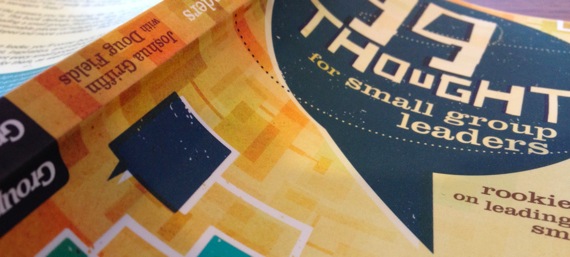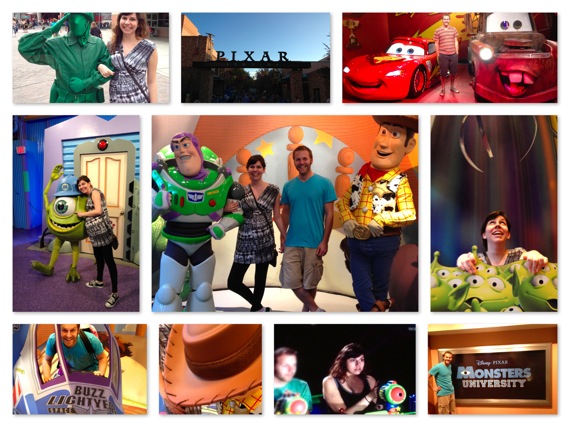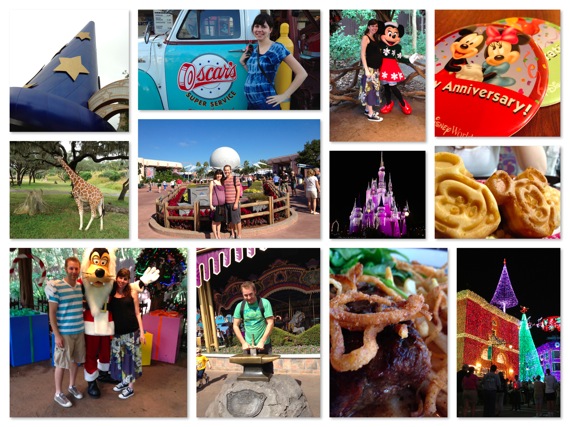 Where does an idea come from? What is it that sparks the imagination so that it creates a painting, a screenplay, a poem, or a song? I am fascinated at what it is that makes one day seem like a day where creativity spills out of my brain and other days it feels like scratching nails against a chalkboard. I don't think there is a trick to make your day an idea-filled day, but I have noticed a few places that seem to help me generate ideas.
Where does an idea come from? What is it that sparks the imagination so that it creates a painting, a screenplay, a poem, or a song? I am fascinated at what it is that makes one day seem like a day where creativity spills out of my brain and other days it feels like scratching nails against a chalkboard. I don't think there is a trick to make your day an idea-filled day, but I have noticed a few places that seem to help me generate ideas.
Ideas come from ideas.
We may like to believe that our ideas are completely original and purely from our own imagination, but the truth is that instead our ideas are likely connected to other peoples' ideas. This doesn't mean we are stealing their ideas, in fact, it's not even close to that. But the reality is that ideas, whether good or bad, inspire us to think of other ideas. We may have an idea for a brilliant sermon series that was inspired simply from a word mentioned in an interview on TV. It came from another idea; although there is no way anyone could ever figure out what the inspiration was. You might have a bad idea for video clip to use, yet when discussing it with the team, it triggers somebody else with an idea that fits perfectly. This is common. Ideas inspire more ideas. The more ideas you come up with, the more they will inspire. The more creative inspiration you consume, the more ideas you will generate.
Ideas come from hard work.
Some days it feels like all your ideas are terrible and there is not a creative bone in your body; those are critical moments in your creative work. You may not come up with any usable ideas on a day like this, but the creative work of putting ideas on paper improves your ability to generate ideas, and as we learned from the previous point, it may inspire other ideas on another day. Creating, just like most other skills, requires us to work on it and improve the craft. We will come up with great ideas if we go through the hard work and improve our abilities of creating by creating even on the uninspired days.
Ideas come from doing other stuff.
Have you ever had a moment in the middle of the night when you had a brilliant idea? I have, and I've also had moments where I felt the idea was so brilliant that I could not possibly forget it...only to wake up the next morning only remembering I had a great idea and not remember what it was. There is something about not working specifically on an idea that allows the brain to be creative. I'm sure there's some science behind it, but all that I know is when I do things completely other than what I'm creating, it often allows my brain to be more creative. What are mundane everyday tasks that you can do that will allow you to stop working on your ideas so your brain can be creative subconciously?
Where do you notice ideas coming from?
Photo Credit: Steve and Sara

 Have you ever waited for something with great anticipation? When I gave Jessica her anniversary present, I was counting down the days before
Have you ever waited for something with great anticipation? When I gave Jessica her anniversary present, I was counting down the days before  If you lead a youth ministry team, you are likely looking for ways to train and equip your team. I could not do what I do without the team of volunteers that dedicate so much time to volunteering with our middle school students. As we work with teenagers, training can help our team be reminded of their calling to teenagers and be equipped as they learn what's important for this age and stage of life. The more and more we serve, the easier it is to forget some of the most basic elements of youth ministry.
If you lead a youth ministry team, you are likely looking for ways to train and equip your team. I could not do what I do without the team of volunteers that dedicate so much time to volunteering with our middle school students. As we work with teenagers, training can help our team be reminded of their calling to teenagers and be equipped as they learn what's important for this age and stage of life. The more and more we serve, the easier it is to forget some of the most basic elements of youth ministry. Anybody who preaches on a weekly basis will tell you that they would much rather have the feeling that "they have something to say" over the feeling that "they have to say something." But what about those cases it is the latter? What is a pastor supposed to do when Sunday is coming and the pressure to come up with some words of wisdom is growing? My favorite times to teach our students are the weeks when I've studied and have felt like I have a lot to say, but the reality is that occasionally I have my selected topic or scripture for the week and my mind is blank.
Anybody who preaches on a weekly basis will tell you that they would much rather have the feeling that "they have something to say" over the feeling that "they have to say something." But what about those cases it is the latter? What is a pastor supposed to do when Sunday is coming and the pressure to come up with some words of wisdom is growing? My favorite times to teach our students are the weeks when I've studied and have felt like I have a lot to say, but the reality is that occasionally I have my selected topic or scripture for the week and my mind is blank. This week, we finished off a 3 week series entitled "Me & My Peeps." This series was all about friendships; since friends are important to all of us, whether we are little kids, teenagers, or grown ups, it is important to look at what the Bible teaches us about choosing friends and being a good friend. The third and final week of the series was about what to do in the cases we find ourselves with a bad friend. What do we do when there are people who wouldn't make good friends; should we keep our distance or still get to know them? The best way for us to answer these questions is to dig into how Jesus responds when he is treated poorly and think about what that means for us and our relationships.
This week, we finished off a 3 week series entitled "Me & My Peeps." This series was all about friendships; since friends are important to all of us, whether we are little kids, teenagers, or grown ups, it is important to look at what the Bible teaches us about choosing friends and being a good friend. The third and final week of the series was about what to do in the cases we find ourselves with a bad friend. What do we do when there are people who wouldn't make good friends; should we keep our distance or still get to know them? The best way for us to answer these questions is to dig into how Jesus responds when he is treated poorly and think about what that means for us and our relationships. When you see a glowing apple on the back of a laptop, what does that tell you about the computer? When you drive by a restaraunt with golden arches in front of the building, what do you immediately know about the food being sold? The branding and design help create an immediate association between the product and the context it is presented in. Certain images, shapes, colors, and stories are intertwined with a product, such as a computer, so that when somebody sees a white computer with an apple on it, it is not just an average computer but it's an
When you see a glowing apple on the back of a laptop, what does that tell you about the computer? When you drive by a restaraunt with golden arches in front of the building, what do you immediately know about the food being sold? The branding and design help create an immediate association between the product and the context it is presented in. Certain images, shapes, colors, and stories are intertwined with a product, such as a computer, so that when somebody sees a white computer with an apple on it, it is not just an average computer but it's an  An individual lego piece doesn't seem like that big of a deal. A single block really has very little value. You can't build anything with one piece and there are very few, if any, ideas of how you could creatively do something special with a single block. But this single block changes when all of the sudden you begin adding other blocks into the picture. A single block when combined with hundreds of other single blocks has virtually an unlimited amount of possibilities. The single block could be used as a piece of a rocket ship, a race car, or something completely different. Individually the impact of a single piece of lego is very small, but combined with many other pieces the impact has massive potential.
An individual lego piece doesn't seem like that big of a deal. A single block really has very little value. You can't build anything with one piece and there are very few, if any, ideas of how you could creatively do something special with a single block. But this single block changes when all of the sudden you begin adding other blocks into the picture. A single block when combined with hundreds of other single blocks has virtually an unlimited amount of possibilities. The single block could be used as a piece of a rocket ship, a race car, or something completely different. Individually the impact of a single piece of lego is very small, but combined with many other pieces the impact has massive potential.


 Walt Disney and Steve Jobs; two men who have had an incredible impact on history we know it. Stories that have touched our lives; life-long memories from family vacations. Technological advancements that have changed the way that we consume media. Both Steve Jobs and Walt Disney brilliantly led organizations that have had enormous impact on the world around them. But in the midst of this impact there is an interesting difference in respects to these two men and their families.
Walt Disney and Steve Jobs; two men who have had an incredible impact on history we know it. Stories that have touched our lives; life-long memories from family vacations. Technological advancements that have changed the way that we consume media. Both Steve Jobs and Walt Disney brilliantly led organizations that have had enormous impact on the world around them. But in the midst of this impact there is an interesting difference in respects to these two men and their families.